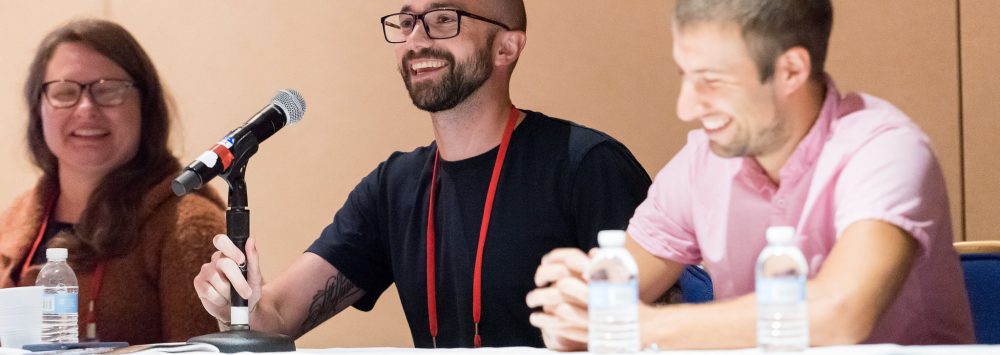Spenser Gabin is a videographer living in California. Inspired by attending the Annual OCD Conference, he is planning to go to school this fall to become an OCD specialist.
About two years, I first came across the IOCDF through a video they posted on Facebook featuring Dr. Jonathan Grayson. Dr. Grayson’s book, Freedom from Obsessive Compulsive Disorder: A Personalized Recovery Program for Living with Uncertainty, was instrumental in my recovery from OCD. I wanted to make a contribution to the OCD community, so I decided to contact the organization to see if they were interested in having professional videos made at their annual conference. They were interested and I have had the pleasure of attending and making videos at both conferences the last two years - in San Francisco in 2017 and Washington D.C. in 2018.
While I was excited to attend my first conference, I was slightly apprehensive because I didn’t know anyone and I wondered if anyone else would understand my particular issues. I thought I was somewhat unusual in that I had doubts about whether I really had OCD or whether my case was severe enough to justify going to an OCD conference in which I would present myself as an OCD sufferer. I have since learned that these doubts are not unusual. In fact, this past year, I spoke on a panel at the conference with Stuart Ralph, Chrissie Hodges, and Alison Dotson in which we discussed this particular doubt.
While Grayson’s book provided the intellectual and theoretical foundation in my recovery, the emotional component has come largely from my connection to other sufferers and the sense of understanding that such connections provide. When I spoke on that panel, I felt completely understood in a way that is unparalleled by any other setting. I found that it was much easier to be vulnerable when I was in a group and in an environment where people were likely to be empathetic. It was incredibly rewarding when people approached me after the panel and shared that my story had helped them or might be helpful for a loved one. In my conversations with other sufferers at the conference, there has been such a strong sense of understanding that is extremely difficult to find anywhere else. The conference gives you an opportunity to get to know people on a deeper level and it’s especially fun to leave the hotel and hang out in more casual settings.
Perhaps due to stereotypical portrayals of OCD, I admit to having had a skewed view of what “typical” OCD sufferers were like. I saw myself as a departure from this “typical” sufferer and was thus concerned that I would not fit in at the conference. Again, this was proven to be misguided through my experience interacting with other sufferers. I met many people who had extremely similar obsessions and compulsions (my compulsions are almost exclusively mental, which I assumed was rare or some kind of outlier case, this is yet another misconception which was disabused by the conference) and found tremendous relief in their sense of understanding and camaraderie in our collective struggle and recovery.
These relationships also elicit the common sense of humanity behind mental health issues. It is one thing to consider the abstraction created by a statistic in a psychopathology textbook; it is another to realize that everyone battling mental illness has their own particular background, personality, and complexity that cannot be summarized or understood by any particular diagnosis or data set. We may have OCD, but we are much more than OCD.
It has been a pleasure to meet so many OCD professionals through the process of making videos at both conferences. The opportunity to talk to them one-on-one and develop those relationships has been extremely satisfying. In fact, it was a large influence in my decision to change career paths and become an OCD specialist (I plan on beginning graduate school in the fall). In particular, Jon Hershfield’s experience as both a specialist and sufferer has been especially inspiring.
In our increasingly digitized world, the IOCDF’s conference is a wonderful opportunity to put away your screens and focus on the people right in front of you. While it can be nice to connect with people through online forums, nothing beats sharing physical space with people who understand you. While the panels and presentations at the conference are diverse and well-executed, the most satisfying aspect of it is connecting with people outside of any formal structure. The atmosphere at the conference is extremely accepting and there is no pressure to attend any particular speaker or panel. If you would rather just sit outside the hotel and chat with a new friend, that is perfectly acceptable and even encouraged.
All in all, the conference is a wonderful experience that can only truly be had once a year. I highly recommend it to anyone looking to connect with others who will understand their struggle with OCD.
Interested in attending the 26th Annual OCD Conference?
To learn more about the 26th Annual OCD Conference, taking place in Austin, TX from July 19-21, click here.


Leave a Reply